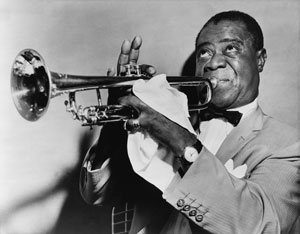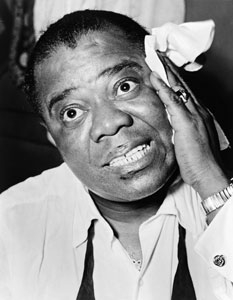|
to give a good show’
The legend of Louis Armstrong, America’s greatest gift to the world THIS IS the centenary year of Louis Armstrong, one of the most influential artists in the history of popular music. So look out for plenty of celebrations - concerts, re-releases of recordings, books and screenings of his many movies. There has been some debate about the timing of Satchmo's arrival in this world. For the discovery of a birth certificate in 1983 suggested or - depending on your point of view - proved that Armstrong's claim to have been born on July 4, 1901, was a little white lie. In fact, he was born on August 4 that year. Though since in many ways he epitomised the rags-to-riches American Dream, it is perhaps fitting that he said he had arrived on Independence Day. In addition, since Armstrong was dubbed “The King” early in his career, perhaps it is only right that, like HM the Queen, he should have two birthdays. Certainly, history will not begrudge him a second helping of remembrances as, everywhere you look, praise is being heaped upon this remarkable man. Legacy If your knowledge of his legacy extends only to his beaming smile and renditions of Hello Dolly or What a Wonderful World, then this centenary may be exactly the excuse you need to discover more of his incredible achievements. "It is impossible to overstate Armstrong's importance in jazz," says the Guinness Who's Who of Jazz. Indeed, it is true that, the deeper you look into his life, the more apparently-exaggerated testimonies become clichés. Selecting him among its “100 People Who Made The Millennium”, Life magazine described him as “America's greatest gift to the world”. The fact is that he achieved fame and fortune at a time when the world of dreams was one of the few areas open to Southern blacks. By sheer force of personality, talent and dedication, he worked his way into the pantheon of popular culture, becoming not only a distinguished musician but also an icon for black people everywhere. He grew up in a run-down New Orleans apartment block with his mother. Mayanne and younger sister, Beatrice - his father, William, abandoned the family during Louis's infancy. He roamed the streets - among the honky-tonk joints, dancehall and brothels - and hustled for money to support the family. Armstrong was a street kid, and his youthful over-exuberance led him to a reform school as a teenager after firing a pistol into the air during New Year's Eve celebrations in 1912. Ironically, it was at the Colored Waifs' Home for Boys that he blew his first horn and took those first mythical steps toward becoming a legend. Released from the home in mid-1914, he lived with his father briefly, then returned to his mother. He came under the tutelage of Joe - later “King” - Oliver, one of New Orleans' finest trumpet players. Innovator Within 10 years, he was recognised throughout the United State as an untouchable innovator, setting standards for the chasing pack. Time magazine critic Stanley Crouch rates Armstrong in the same rarefied league of all-time greats such as Igor Stravinsky, Pablo Picasso and James Joyce. Crouch goes on to say that Armstrong "supplied revolutionary language that took on such pervasiveness that it became commonplace like the light bulb, the airplane, the telephone". The artistes and bands he played with - before and after setting up and leading his Hot Five in late 1925 - read like a musical roll of honour. They included King Oliver, Kid Ory, Fletcher Henderson, Sidney Bechet, Bessie Smith, Clarence Williams, Carroll Dickerson, Jimmie Rodgers (the "father of country music"), Billie Holiday, Benny Goodman, Ella Fitzgerald, Duke Ellington, Dean Martin, Barbra Streisand and Pearl Bailey. After World War II, the years began to take their toll on even Pops’ robust talent. As his ability began to wane, he handed the baton of innovation on to a new generation of jazz musicians, indelibly influenced by his pioneering spirit. Charlie Parker, Miles Davis and John Coltrane all picked up on elements of Satchmo's style. However, his contribution did not stop at jazz. You can hear traces of his technique in the music, which evolved from the jazz tradition - swing, blues, ballads, rock, Afro-Hispanic rhythms. Not only did his trumpet virtuosity completely re-route the direction of jazz, but his erratic scat singing style (which he always claimed was born of necessity when a lyric sheet fell to the floor during a recording session) virtually invented vocal improvisation. Armstrong took songs of the day and re-interpreted them with his own idiosyncratic growls, tics and warbles, paving the way for vocal performers who followed him. Bing Crosby, Billie Holiday, Frank Sinatra, Elvis Presley and Marvin Gaye all owe him a tremendous debt. Popularity Paradoxically, as his creativity began to deteriorate, his popularity began to rocket. Commercial success was just around the corner. In the 1930s and '40s, his status evolved from jazz trail-blazer to all-round show-bizzer, as he applied his boundless energy and enthusiasm to movies. Racial segregation was still common in many parts of the USA. However, through his success in films such as the 1956 smash High Society, alongside Bing Crosby, Frank Sinatra and Grace Kelly, Armstrong proved he could match - and better - the best of white stars. Two years later, he made The Five Pennies with Danny Kaye. He travelled the world, becoming an internationally-recognised ambassador for jazz. Though, during the 1950s, the social climate changed and young blacks criticised him for being an “Uncle Tom” - an all-singing, all-dancing, all-too-eager-to-please clown. Maybe he was guilty of hamming it up for his audiences. But, as he was a born performer and a naturally flamboyant character, there cannot have been much difference between the person and the persona. Armstrong pioneered black civil rights in a similar way to another great showman - Muhammad Ali - leading by example. Through self-discipline, self-respect and unswerving devotion to his art, he proved he was a formidable man - one who broke down many barriers as he made his way to the top. His musical career reached a pinnacle in the mid-1960s when, old enough to be their grandfather, he halted The Beatles' domination of the charts with his first-ever US Number 1, Hello Dolly. He followed this success with his first-ever British chart-topper, 'What a Wonderful World. And, at 67, he was the oldest performer to claim the coveted top slot. Soul mate But he had yet more shots in his locker, for example recording the soundtrack for On Her Majesty's Secret Service in 1969 and continuing to make guest appearances on high-profile television shows in the US, Britain and elsewhere. Armstrong was much married: first to Daisy Parker, a Louisiana prostitute, in 1918, then to Lil Hardin, pianist in King Oliver's Creole Jazz Band, in 1924, and to Alpha Smith in 1938. He found a more enduring soul-mate in Lucille Wilson, whom he wed in 1942. She bought them a house in Corona in New York's Queens district, where they were to live out the rest of their lives. When Armstrong died in his sleep in New York on July 6, 1971, tributes poured in. President Richard Nixon and the US State Department were among the mourners paying their respects. The final word must come from the man himself, summing up his appeal with the same perfect pitch and tone which he extracted from his horn. "I never tried to prove nothing - just wanted to give a good how," Armstrong said. "My life has always been my music. It's always come first, but the music ain't worth nothing if you can't lay it on the public. Audience "The main thing is to live for that audience, 'cause what you're here for is to please the people." Wynton Marsalis, most celebrated trumpeter of his generation, has already begun tipping his horn in homage to the past-master. Torchbearer for Satchmo's memory, the inspirational Marsalis returned to London's Barbican Centre last week to play three dates with the Lincoln Center Jazz Orchestra and host three days of concerts, films, talks and educational workshops devoted to Louis Armstrong's continuing legacy. On Friday, Marsalis kicked off proceedings by invoking the spirit of the man who embodied jazz and delving into his rich repertoire. Free to concert ticket holders, this pre-show talk and discussion were led by Alan Shipton. On Sunday, Marsalis was back, singing the praises of his mentor with an illustrated talk, accompanied by some rarely-seen film clips. Movies This talk was preceded by a unique triple-bill of Armstrong's movies. Rhapsody in Black and Blue, his earliest film, tells the story of a fan dreaming he was alongside the immortal trumpet player. Numbers include Shine and I'll Be Glad When You're Dead, You Rascal. The Louis Armstrong Allstars studio made band-stand performance featuring Nobody Knows the Trouble I've Seen and 'When the Saints Go Marching In. Hello Satchmo is a rarely-screened documentary of Armstrong's rapturously-received 1965 tour of Czechoslovakia. In a fitting finale, 1,500 primary school children joined Marsalis and members of the Lincoln Center Jazz Orchestra in a private animated jazz tribute to the power of Satchmo's music. In parallel, Morpeth School Band worked with composer Paul Griffith to compose their own interpretations of Louis Armstrong's jazz styles. Joined by soul divas Julia Roberts and Denys Baptiste, the Morpeth band performed its new composition as part of Sunday's Freestage programme. Also a native of New Orleans, Marsalis has long advocated Armstrong's enduring influence, and says: "He left an undying testimony to the human condition in the America of his time." Spirit A true heir to indomitable spirit, Marsalis refers to “Pops” as the Thomas Edison of jazz. He says: "All we can do is be glad we lived in the same century as Armstrong." The Marsalis-Lincoln Center line-up will be busy at a festival in New York on July 4. But the occasion will not pass unnoticed in Britain. For example, the Louis Armstrong Centenary Festival is on the diary for June 29-July 2 at Bracklesham Bay near Chichester, West Sussex. Columbia/Legacy has issued The Complete Hot Five and Hot Seven Recordings, a set of four CDs which capture Armstrong at his youthful best in the 1920s. And Oxford University Press has published Louis Armstrong in His Own Words: Selected Writings, edited by the musicologist, Professor Thomas Brothers of Duke University. Tributes to Mr Jazz Duke Ellington: "If anybody was Mr Jazz, it was Louis Armstrong. He was the epitome of jazz, and always will be. He is what I call an American standard, an American original." Tony Bennett: "The bottom line of any country is: What did we contribute to the world? We contributed Louis Armstrong." Miles Davis: "You can't play anything on a horn that Louis hasn't already played." Bing Crosby: "I'm proud to acknowledge my debt to the 'Reverend Satchelmouth'. He is the beginning and the end of music in America." Dizzy Gillespie: "Louis is not dead, for his music is and will remain in the hearts and minds of countless millions of the world's peoples, and in the playing of hundreds of thousands of musicians who have come under his influence."
Compilation by Anthony Howard 1,878 words for The Voice Photos: New York World-Telegram and Sun Newspaper Photograph Collection |

